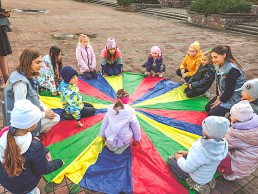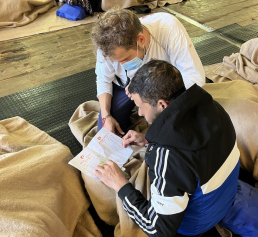Rights of Children on the Move
1. Ukraine | New dreams | Terre des hommes Lausanne

Mobile Teams with child refugees in Rozhnyativ village
©Tdh/Anastasiia Vovk
“When we arrived in the Ivano-Frankivsk region, my son was very sad because of all the talk about the war. But the psychosocial activities of Terre des hommes helped him, and he became more cheerful.” says Tetiana, an internally displaced mother of three children from Ukraine.
You will hear the joy before you see it. The laughter as six children run together across the grass. They stretch upwards, the littlest ones reaching right to the ends of their fingertips, to touch the colourful parachute they carry over their heads. A squeal of delight rings out as the light fabric swooshes across a five-year-old girl, reflecting red, then blue, then green, onto her beaming face. The uplifting atmosphere in this child-friendly space could not be more of a contrast to what this little girl has experienced.
Children who have lost their home, community, school and been separated from family can feel as if their life before war was a dream. They are plagued by nightmares of falling bombs and fleeing for safety.
After the first Russian bombs fell in February 2022, Terre des hommes teams already working in Ukraine, Moldova, Romania and Hungary sprang rapidly into action, supporting more than 100,000 displaced children, members of their families and communities.
In Ukraine, children and their families received food, school and hygiene materials, participated in psychosocial sessions and were supported with improved living conditions, including materials to help them survive the cold winter, as Terre des hommes teams worked with local social welfare bodies to help them.
In Hungary, Romania and Moldova, Terre des hommes supported refugee families first through the initial emergency, then continued providing longer-term support. Together with national authorities and local organisations, our teams ensured that refugees fleeing the war in Ukraine had access to essential services like shelter, food and health services as well as psycho-social support such as mental health, recreational and educational support. Special attention is always paid to unaccompanied or separated children and those most at risk of exploitation.
Read more about the support provided and families helped here.
Watch a video of emergency efforts during the crucial first moments of the war.
2. Italy | Al Himaya project | Terre des Hommes Italy

Welcome activities run at the clinic in Ragusa for new arrivals
In the sun-soaked shores of Sicily, Italy, where waves carry tales of hope and despair, Terre des Hommes Italy embarked on a transformative journey through the Al Himaya project. This initiative, spanning from April 2021 to September 2022, sought to break the cycle of violence against migrant children in the cities of Catania, Messina, Palermo, Ragusa, and Trapani.
Migrant children often bear the scars of violence, both before their perilous journeys and after their arrival on foreign shores. Recognising their unique needs and challenges was crucial, not only for their immediate well-being but also for their eventual integration into host societies. Al Himaya was born from this understanding, with a mission to build and strengthen child protection systems, emphasising prevention, in collaboration with local authorities and municipal social services.
“I feel better. My fears are now written on these sheets and burying them makes me think they will go away” says Sami, a 9 year old child who lost an arm in an accident while escaping from his country. His arrival in Italy, after a perilous voyage across the Mediterranean, marked a new chapter of hope. Through the support and care provided by Terre des Hommes, Sami began the process of healing, mending not only his physical wounds but also nurturing his emotional well-being.
In Ragusa, our work was already underway through the FARO project, where we provided psychological support to unaccompanied children on the move and their families who were navigating the daunting realities of crowded reception centers and integration processes. Al Himaya built upon these foundations, forging two vital pillars of support.
First, we strengthened the capacity of municipal social services, creating multidisciplinary teams to support them in caring for migrant children facing violence or at risk of it.
Secondly, we initiated a peer-to-peer training programme for community leaders and migrant representatives. This training programme shared knowledge and tools to combat violence against migrant children effectively.
Finally, through a UNICEF project, we worked diligently to promote the mental well-being of refugee and migrant boys, girls, caregivers, and host communities across Italy. Our teams, stationed in Milan, Genoa, and Ragusa, reached 30 reception centers, engaged 250 youths in psychosocial group activities, and trained nearly 500 frontline workers and caregivers.
Read more about the impact of the Al Himaya project on the website (in Italian).
